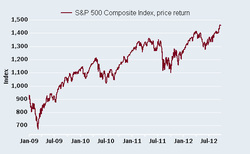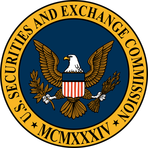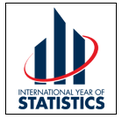
As of Sept. 21, 2012.
Lots of talk, recently, about high frequency trading. High-frequency traders compete on the basis of speed with other high-frequency traders, not long-term investors (who typically look for opportunities over a period of weeks, months, or years), and compete for very small, consistent profits. Complex computer driven algorithms drive the calculations and transactions. It's not about earnings and management, it's about fractions of dollars and daily liquidation of positions. Point is, does the individual investor stand a chance in today's market?
The numbers would indicate that we have very little faith in Wall Street, have left the playing field in record numbers, and missed the most disrespected bull market in history. Stocks are on their way to a five year high and have more than doubled since the financial crisis began. Investors with the smallest savings are seeing the lowest percentage recovery in returns. Getting out at the bottom (2007-2009) and remaining on the sidelines, scared to death.
As a result, if the economic woes aren't bad enough for the average American, we are becoming more and more financially unprepared for retirement. Income disparities between rich and poor are increasing and grew sharply, the U.S. Census Bureau said, in 2011.
More statistics:
My partners over at Charles Schwab comment, "it's been five solid years of steady outflows from equities and inflows into bonds. Even 3-1/2 years into this bull market and the gains we've seen since June, it has not turned that psychology around."
This psychology has us pulling out of equities when the going gets rough and chasing higher returns when things look bright. Selling at the bottom and buying at the top.
We've discussed many looming concerns, but here are some disturbing observations:
What do you do? Fear and greed drive the markets. To have any chance at retirement, you must be in risk assets. There is no way around it. Inflation will eat you alive.
You do stand a chance. There will be ups and downs in the markets. Invest during the pullbacks, rebalance during the highs. Don't panic. For fixed income, seek bonds (Bonds Article Library). This market has further to run. October is historically a rocky month. Europe, elections, monetary policy, hedge funds hoarding cash or shorting positions, fiscal cliff, U.S. debt rating (repeat of last October?), fund managers seeking a strong 2012 finish; all dips and momentum could be buying opportunities.
You may not be a high frequency trader or a London Whale, but there is a boat leaving daily, don't miss it. Do your research, consult reliable professions, Sua Sponte.
Bradford C. Bruner for Sua Sponte Wealth Management
The numbers would indicate that we have very little faith in Wall Street, have left the playing field in record numbers, and missed the most disrespected bull market in history. Stocks are on their way to a five year high and have more than doubled since the financial crisis began. Investors with the smallest savings are seeing the lowest percentage recovery in returns. Getting out at the bottom (2007-2009) and remaining on the sidelines, scared to death.
- Those with less than $100,000 in investable assets on average had $17,975 at the end of 2011, down 9 percent from $19,732 at the end of 2007.
- Those with $500,000 to $2 million saw a 7 percent uptick to $966,948 from $903,219.
- The vast majority of U.S. households (73%) - 87 million of the almost 119 million in 2011 - have less than $100,000 in assets, according to the data.
As a result, if the economic woes aren't bad enough for the average American, we are becoming more and more financially unprepared for retirement. Income disparities between rich and poor are increasing and grew sharply, the U.S. Census Bureau said, in 2011.
More statistics:
- After climbing to 53 percent in 2001, equity ownership in individual stocks, mutual funds, ETFs and variable annuities fell to 48.2 percent in 2008 and 46.4 percent in 2011. A 12.5% decline.
- Investors pulled $235 billion out of U.S.-domiciled equity mutual funds, considered a proxy for retail investors, since 2007.
- $53 billion has come out since last October, the bottom of a two-month selloff sparked by the crisis in Europe and the loss of the United States' top credit rating. During that stretch, the benchmark Standard & Poor's has gained 28 percent, the Dow industrials 24 percent.
My partners over at Charles Schwab comment, "it's been five solid years of steady outflows from equities and inflows into bonds. Even 3-1/2 years into this bull market and the gains we've seen since June, it has not turned that psychology around."
This psychology has us pulling out of equities when the going gets rough and chasing higher returns when things look bright. Selling at the bottom and buying at the top.
We've discussed many looming concerns, but here are some disturbing observations:
- The median balance was $58,000 for workers 55-64 with a 401(k) retirement plan at the end of 2010. The median for all 401(k) participants that year was $17,686.
- 60 percent of workers and or their spouses had less than $25,000 in savings and investments excluding their homes and pensions (May 2012).
- Risk aversion among all age groups has been on the rise since 2006, including Generation X and Y, who have lived through a number of market collapses.
- Bank accounts and money market funds currently pay next to nothing and a 10-year bond is yielding little more than 1.6 percent.
What do you do? Fear and greed drive the markets. To have any chance at retirement, you must be in risk assets. There is no way around it. Inflation will eat you alive.
You do stand a chance. There will be ups and downs in the markets. Invest during the pullbacks, rebalance during the highs. Don't panic. For fixed income, seek bonds (Bonds Article Library). This market has further to run. October is historically a rocky month. Europe, elections, monetary policy, hedge funds hoarding cash or shorting positions, fiscal cliff, U.S. debt rating (repeat of last October?), fund managers seeking a strong 2012 finish; all dips and momentum could be buying opportunities.
You may not be a high frequency trader or a London Whale, but there is a boat leaving daily, don't miss it. Do your research, consult reliable professions, Sua Sponte.
Bradford C. Bruner for Sua Sponte Wealth Management

















































